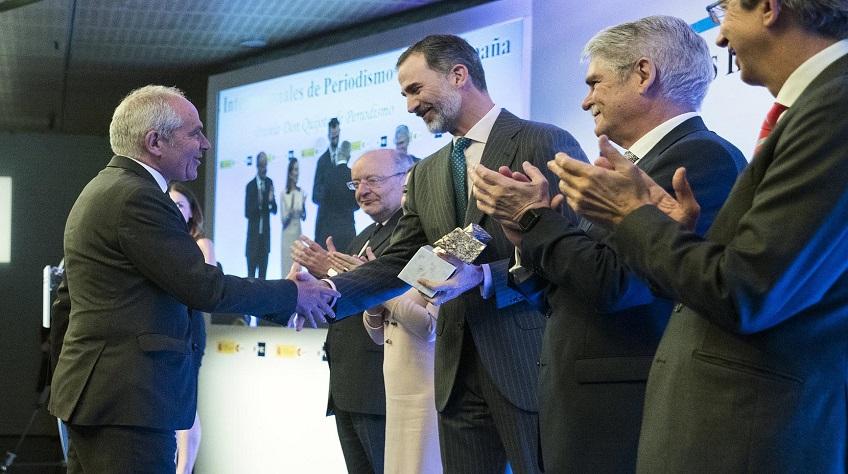News
EL PAÍS receives ‘Premio Rey de España’ for the Most Outstanding Communications Media in Ibero-America
25-04-2018

The most outstanding work in news media from both sides of the Atlantic were honored on Tuesday at the King of Spain International Journalism Awards during a ceremony in which Felipe VI warned of the "exponential spread" of fake news and stressed that professional independent journalism, inspired by ethical values, is now "more necessary than ever". EL PAÍS, the newspaper of record in the Spanish language, both worldwide and especially in Latin America, received the award for the most outstanding communications media in Ibero-America.
News quality, sustainable development and a vocation to serve the Ibero-American world are the three criteria under which the prizes are awarded each year by news agency EFE and the Spanish Agency for International Cooperation for Development (Aecid). During the awards ceremony, held yesterday at the Casa de América, in Madrid, the King argued that journalism is an "effective instrument at the disposal of free societies to guarantee the right to information", and that it is closely linked to the quality of democracy and to peaceful coexistence.
To face the challenge of fake news, which threatens "the very right of citizens to receive accurate and truthful information", King Felipe VI said journalism must be "subject to the rules of corroboration and verification of sources" and that it must at all times be committed to "serious, rigorous and critical" news and information.
Testament to the strength of journalism in Spanish and Portuguese, the winners are an example of a profession committed to "rigor and independence," the King added. He also stressed "the clear commitment to quality, reliability, and trust" in the media among citizens.
In this 35th edition, the awards paid tribute to the work of journalists from eight nationalities. EL PAÍS received the award for the most outstanding media organization in Ibero-America.
The jury lauded the vital role played by the newspaper, founded in 1976, in Spain’s transition to democracy, adding that it is the clear newspaper of record in the Spanish language and the one with the largest circulation worldwide, particularly in Latin America, where it has its own digital edition in Spanish and another in Portuguese (for Brazil), plus a print edition available in a number of countries. The jury recalled that over these past 40 years, EL PAÍS "has been witness to the main events that have taken place around the world and, particularly, in Spain and Latin America".
The Editor-in-Chief of EL PAÍS, Antonio Caño, expressed "satisfaction and pride" at the award and stressed that the newspaper’s strategy for the future has been, for a number of years, centered around the two priorities of digital transformation and globalization, a goal that translates into a "robust presence in Latin America." "This award recognizes that we are doing things right," added Caño.
An example of the strong roots that EL PAÍS has put down on the other side of the Atlantic is the staff of one hundred who work in the newspaper’s offices in Mexico City and São Paulo, as well as in the different bureaus in the region. In Latin America, annual growth for the newspaper is 50%, while in Mexico it is the fourth most read online daily.
Before the winners were invited to pick up their commemorative sculpture, by Joaquín Vaquero Turcios, from the King, the President of EFE, José Antonio Vera, praised "the curiosity, tenacity and courage of the professionals to tell the truth and get to the bottom of the news".
The jury reviewed the work of 274 candidates from 19 countries before singling out work on the drama of refugees, the effects of natural disasters and environmental challenges. Argentina’s Juan Roberto Mascardi took the Ibero-American Journalism Prize for his report "Farré, the player who forgot to score goals", published by La Voz del Interior, in which he recounts the life of a player who scored a historic goal.
In the television category, the prize went to Costa Rica’s Alexánder Rivera for a report on the effects of Hurricane Matthew in Haiti, and in the radio category, Portugal’s Rute Isabel da Silva took home the award for a program on the life of a family who make violins.
In the press category, Spaniard Alicia Hernández won the award for an article in The New York Times on the illegal trafficking of gasoline in Venezuela. And in the digital journalism category, the Brazilian Patricia Toledo de Campos was honored for Un mundo de muros (A World of Walls).
The Colombian Santiago Saldarriaga won in the category of photography for an image of the floods in Mocoa, published in El Tiempo, while the special prize for environmental journalism went to the Cuban Julio Batista Rodríguez for the report "The dead waters of Havana Club ", on effluent from the rum distillery.
Finally, the 15th annual Don Quixote Journalism Prize this year went to the writer Fernando Aramburu for his article "We are made of words", published in El Mundo, in which the author of Patria vindicates the power of language.
Source: EL PAÍS
It may interest you



